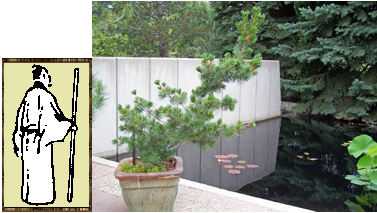
Hexagram Seven—Leadership
To be an effective leader, one should train the members of the group to be mature and responsible. Similarly, the commander of an army must be able to trust the soldiers and rely on them to make decisions and carry out orders.
The first line, yin, shows that harmony in the group is essential. If an army is disorderly, it cannot fight properly, even for a noble cause.
The second line, yang, shows the leader involved in the action, giving out orders side by side with the troops. His or her participation encourages the other group members.
The third line, yin, says having a leader or group member who acts foolishly is just as bad as losing a soldier in battle.
The fourth line, yin, shows the army resting at a camp in the distance. The wise leader treats people well and encourages team members to balance work and rest.
The fifth line, yin, shows rodents destroying crops. Immature leaders would lose soldiers even on such an easy assignment. Never appoint an unfit person to any job.
The sixth line, yin, shows a great ruler choosing the heads of state. If the leader appoints greedy, inept assistants, the people will loose respect and the country will fall into disorder.
Hexagram Seven Commentary
The introduction to Hexagram Seven says, "To be an effective leader, one should train the members of the group to be mature and responsible." This is the idea of mentorship, which is lacking in many circles. Some leaders want all the power for themselves, but this goes against the Dao. When leaders fail to train younger, or newer people for leadership, they weaken the system. We need leaders who are generous with their power, who are ready to share responsibility with others.
The introduction also says, "the commander of an army must be able to trust the soldiers and rely on them to make decisions and carry out orders." Trust comes from sharing. Leaders who are greedy with their power, who refuse to share it even with their closest associates, ultimately find themselves surrounded by people who envy them, who cannot be trusted. Leaders need to teach as well as lead if they want their associates to learn how to make good decisions and act responsibly.
The first line, yin, says harmony is essential. This value is the basis of the classic business manual, How to Win Friends and Influence People, by Dale Carnegie. Carnegie published his book during the Great Depression, in 1936, and it helped millions of people become better salespeople, better managers, and better executives. Carnegie wrote about how to create harmonious business relationships, listening and taking ideas from employees, and treating customers and employees with respect. Carnegie's book was not about humiliation or scaring people into submission, as we see so often in today's workplaces.
The second line, yang, cements this notion. To create harmony, a good leader works side-by-side with those he leads. The leader is not shut off from the action. A boss who gets down in the mud like everyone else creates a bond with those he leads. A good leader makes people want to cooperate. One of the best tools for invoking cooperation is old-fashioned brainstorming. A brainstorming session is egalitarian. Everyone in the session is equal, because everyone is there to contribute ideas. Even weak or undeveloped ideas are welcome, because small ideas can spark a bigger idea. Everyone in a brainstorming session feels energized to do their part to make the vision a reality.
The third line, yin, is a warning, showing how wrong action results in loss. The hexagram shows how a foolish leader is like no leader, a leader who may as well be lost in a battle. Bad leadership is a tragedy. The difference between a functional group and a chaotic non-functioning group is leadership.
The fourth line, yin, shows the importance of rest. Hexagram Seven clearly states: a wise leader encourages team members to balance work and rest. This is a warning to those of us who tend to throw ourselves at a problem relentlessly and never rest. This is bad leadership, because we tend to ignore our other responsibilities to friends, family, and our own body-mind-spirit. When the whole world is falling down around us, stressing just makes it seem worse. To be whole, we must have time off from stress. This is the purpose of meditation and learning ways to take care of oneself.
The fifth line, yin, is another warning: never appoint an unfit person. The best leaders have experience and knowledge for the job. A smart leader in an agricultural society would have studied methods for fighting rodents, such as using a controlled fire to drive them out. An unqualified leader might go to battle with rats and botch the whole thing, even sustaining casualties. We need good leaders who know what they're doing.
The sixth line, yin, explains in ancient times, the rulers chose the heads of state. Nowadays, we elect leaders. Or at least that's how it's set up. In America we my feel saddled with bad leadership at times, including plenty of arguing about it. However, it's the vacuum of qualified leadership that keeps the dysfunctional system in motion. One thing we can do is learn leadership skills ourselves. Good leadership can spring up from the grass roots, which means it grows organically. Instead of becoming cynical or apathetic, we can attend to what's in our own yards. If more people do that, grassroots can fill the vacuum of leadership to promote patience and healing.
To the reader: Most of the hexagrams have at least one line that predicts bad results, but that does NOT mean you are fated to that result. The hexagrams illustrate different attitudes, so study the actions and reactions to learn the attitudes that will lead to better outcomes.
The I Ching teaches you to flow with changes and create positive change from the inside through conscious living. Your future is in your hands. Consult the I Ching for ideas that lead to clear thinking and positive mental attitude. Reading the I Ching helps you take the time to reflect on your attitudes and ideas. Continue asking until you feel positive about your course.

Click here for another hexagram.
A note about this interpretation of the I Ching: Nori Muster wrote this version of the I Ching in 1994 and put it online at Surrealist.org in 2000. It is also available at Amazon:
e-book
paperback
